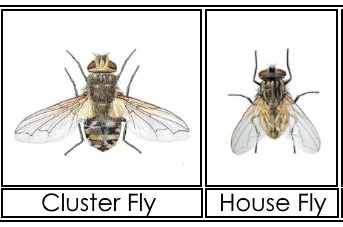How Do You Get Rid of Cluster Flies Naturally: Top Tips
Cluster flies invading your space can be more than just a nuisance. They can disrupt your peace, turning your cozy home into an unwelcome hive of activity.
But what if you could banish these pesky intruders without resorting to harsh chemicals? Imagine a home that feels fresh and natural, free from the buzzing irritation. You deserve that tranquility. In this guide, you’ll discover effective, natural methods to reclaim your space from cluster flies.
With these tips, not only will you learn how to get rid of them, but also prevent them from returning. Ready to enjoy a fly-free home with a touch of nature’s magic? Keep reading to find out how.

Credit: www.youtube.com
What Are Cluster Flies
Cluster flies are pesky insects that invade homes, especially in the fall. Natural remedies like sealing entry points and using essential oils can help keep them away. Consider using vinegar traps or fly swatters to manage small infestations effectively.
Cluster flies might sound like a mystery, but understanding them is the first step to getting rid of them naturally. These flies are often mistaken for common house flies, yet they possess distinct traits. Encountering them in your home can be frustrating, especially when they invade in large numbers.What Are Cluster Flies?
Cluster flies are not your typical nuisance. Unlike house flies, they don’t breed in garbage or lay eggs on food. Instead, they originate from earthworms in the soil. This unique lifecycle makes them fascinating but equally irritating, especially when they seek shelter indoors during colder months. Their slower movement can be an advantage. You might notice them sluggishly buzzing around windows or resting in groups, which is why they’re called “cluster” flies. They prefer quiet, undisturbed places, making attics and unused rooms their favorite hangouts. Have you ever found a group of these flies gathered in a sunny spot? It’s almost like they’re sunbathing! They are drawn to warmth and light, which explains why they often gather near windows. This behavior can be your clue in identifying them. Understanding their habits is crucial. Knowing that they don’t pose a health risk can ease your worry. But their presence can be unsettling and annoying. You don’t want to share your living space with them, right? The good news is, there are natural ways to deal with them. You don’t need harsh chemicals. Instead, simple strategies can help you reclaim your space. Imagine using natural remedies that are safe for you and your family. Consider sealing entry points. It’s a straightforward yet effective method. It keeps them out and prevents future invasions. Have you ever thought about how a bit of caulking can make a big difference? Another tip is to use essential oils. Their scents can deter these unwanted guests. Not only do they keep flies away, but they also leave your home smelling fresh. Isn’t it wonderful when nature provides solutions? Incorporating these methods can transform your home. You’ll find peace without the buzzing annoyance. And the satisfaction of knowing you’ve tackled the problem naturally is priceless. What other natural methods have you tried? Share your experiences and insights.Natural Deterrents
Cluster flies can become a nuisance, especially during the cooler months. They seek warmth indoors, often gathering in large numbers. Using natural deterrents can help manage these flies effectively. Such methods are safe for your family and the environment. Below are some natural options that can help keep cluster flies at bay.
Essential Oils
Essential oils are effective in repelling cluster flies. Peppermint oil is a popular choice. Its strong scent deters many insects, including flies. Mix a few drops with water in a spray bottle. Spray around windows and doors where flies enter.
Lavender oil also works well. Besides repelling flies, it leaves a pleasant aroma. You can place a few drops on cotton balls. Then, place them in areas where flies gather.
Herbal Plants
Herbal plants can naturally deter cluster flies. Basil is one such plant. Its strong scent keeps flies away. Place potted basil plants near windows and entry points.
Mint is another effective herb. It grows easily in pots or gardens. Its aroma confuses and deters flies. Consider planting mint around your home.
Citrus Peels
Citrus peels are a simple and natural repellent. Flies dislike the smell of citrus. Use peels from oranges or lemons. Place them on windowsills and near doors.
Dry the peels in the sun for better results. Dried peels maintain their scent longer. Replace them regularly to keep the aroma strong.
Homemade Traps
Cluster flies can be a nuisance in homes. Natural methods are preferable for controlling them. Homemade traps are a cost-effective solution. These traps use everyday items found in your kitchen. They are easy to set up and help control fly populations.
Sugar And Vinegar Trap
This trap uses sugar and vinegar to attract flies. Mix equal parts of sugar and vinegar in a bowl. Cover the bowl with plastic wrap. Poke small holes in the wrap to let flies in. The smell attracts flies, trapping them inside.
Water And Dish Soap Trap
Water and dish soap create an effective trap. Fill a bowl with water and add a few drops of dish soap. The soap reduces surface tension, causing flies to sink. Place the bowl in areas where flies are common. Flies are drawn to the water and get trapped.

Credit: bluebeetlepest.com
Preventive Measures
Cluster flies can be a nuisance in homes, especially during the colder months. Implementing preventive measures can help keep these pests at bay. Natural methods are effective and environmentally friendly. Here are some steps to prevent cluster flies from invading your space.
Sealing Entry Points
Cluster flies enter homes through small gaps and cracks. Seal these entry points to prevent their access. Check windows, doors, and vents for any openings. Use caulk or weather stripping to close these gaps. Ensure that screens are intact and tightly fitted. This will reduce their chances of entering your home.
Maintaining Cleanliness
Cleanliness plays a major role in preventing cluster flies. Keep your home tidy and free from debris. Regularly dispose of waste and food scraps. This prevents flies from finding food sources. Vacuum and dust frequently to remove any potential nesting sites. A clean environment discourages their presence.
Regular Ventilation
Proper ventilation helps deter cluster flies. Open windows to let fresh air circulate. This reduces humidity, making it less hospitable for flies. Install fans to improve airflow. Ensure your attic and basement are well-ventilated. A well-aired home is less appealing to these pests.
Outdoor Strategies
Cluster flies can disrupt the peace in your home. Understanding outdoor strategies helps manage these pests effectively. They thrive in areas with organic matter. Reducing these elements can minimize their presence.
Garden Maintenance
Keep your garden tidy to deter cluster flies. Trim grass and weeds regularly. Remove fallen leaves and plant debris. These materials provide hiding spots for cluster flies. Consider planting herbs like lavender. They naturally repel many insects, including flies.
Compost Management
Cluster flies are attracted to compost piles. Ensure compost is well-managed to prevent infestations. Turn your compost often to aerate it. This speeds up decomposition and reduces pests. Cover compost bins with lids. This keeps flies from accessing the organic matter.

Credit: maggiesfarmproducts.com
Using Natural Predators
Attracting natural predators like birds can help control cluster fly populations. Spiders and beetles also hunt these flies effectively. Encouraging these predators in your garden or home can reduce cluster fly numbers naturally.
Dealing with cluster flies can be a real nuisance, especially when they invade your home in large numbers. Instead of reaching for chemical sprays, why not let nature lend a hand? Using natural predators to control cluster flies is an eco-friendly and effective way to keep these pests in check. By inviting beneficial insects and birds into your garden, you can create a balanced ecosystem that helps reduce the cluster fly population naturally.Beneficial Insects
Some insects are more than just creepy crawlies; they are your allies in pest control. Ladybugs and lacewings, for example, feast on fly larvae, including those of cluster flies. Introducing these beneficial insects into your garden can dramatically reduce the number of flies before they even mature. You can purchase these insects online or at garden centers. Release them during the early morning or late evening when temperatures are cooler. Make sure your garden has flowering plants to support them with nectar and pollen. Additionally, maintaining a variety of native plants attracts more helpful insects naturally. This provides a sustainable way to keep cluster flies and other pests at bay. Have you ever noticed how a balanced garden seems to thrive? That’s the power of biodiversity at work.Attracting Birds
Birds are not just beautiful songsters; they are excellent pest controllers too. Many bird species enjoy snacking on flies and their larvae. By attracting birds to your garden, you can keep the cluster fly population under control effortlessly. Install bird feeders and birdbaths to invite them in. Planting trees and shrubs offers birds shelter and nesting sites, encouraging them to stay around. Keep your garden varied with both tall and short plants to provide a welcoming habitat for different bird species. Birdhouses can also be a great addition. Have you considered how a simple birdhouse could transform your fly problem? By supporting these natural predators, you not only manage pests but also enjoy the added beauty and serenity birds bring to your garden. Natural predators offer a sustainable solution to cluster flies that benefits both you and the environment. Why not give it a try and see how nature’s balance can work wonders in your space?Diy Natural Sprays
Cluster flies can be a nuisance, especially during the warmer months. These flies often find their way into homes, seeking shelter. Natural sprays offer an effective solution to keep them at bay. You can make these sprays at home with simple ingredients. They are safe for both your family and the environment. Let’s explore two easy DIY natural sprays you can try.
Vinegar And Water Spray
Vinegar is a powerful natural cleaner and repellent. To make this spray, mix equal parts of vinegar and water. Pour the solution into a spray bottle for easy use. Spray it around windows, doors, and any areas where flies gather. The strong smell of vinegar deters cluster flies effectively. It’s an easy and cost-effective solution.
Essential Oil Mixtures
Essential oils not only smell great but also repel flies. Oils like peppermint, eucalyptus, and lavender work best. To create the spray, add 10-15 drops of your chosen oil to a cup of water. Shake well and pour into a spray bottle. Spray the mixture around your home, focusing on entry points. This natural remedy keeps flies away and leaves a pleasant scent.
Lifestyle Adjustments
Natural methods help manage cluster flies. Regularly clean areas where flies gather. Use essential oils like peppermint or lavender to repel them. Seal entry points to prevent infestation.
Getting rid of cluster flies naturally involves making simple lifestyle adjustments. These changes not only help eliminate the flies but also improve your living environment. Who doesn’t want a cleaner, more organized home? Let’s explore some practical steps you can take to make your home less inviting to these pesky insects.Reducing Clutter
Having clutter in your home can be an open invitation for cluster flies. They love to hide in dark, undisturbed corners. Look around your home. Are there piles of old magazines, unused boxes, or forgotten laundry? Consider tidying up these areas. Organizing your space can be as simple as setting aside 15 minutes a day to clear a corner. You might find treasures you thought were lost. Plus, a clutter-free home feels more spacious and welcoming. It’s a win-win situation!Proper Food Storage
Cluster flies might not be directly attracted to food, but improper storage can attract other pests that draw them in. Think about how you store your food. Are there open packages or crumbs lying around? Sealing food in airtight containers can prevent unwanted visitors. Imagine opening your pantry and seeing everything neatly stored. It not only keeps the flies away but also makes meal preparation easier. Additionally, regular cleaning of dining and kitchen areas can be a game changer. Wiping surfaces and sweeping floors removes any temptation for pests. How often do you clean your kitchen? A regular routine can make a big difference. By making these lifestyle adjustments, you not only deter cluster flies but also create a healthier home environment. What other small changes can you make to enjoy a pest-free space?Frequently Asked Questions
What Are Cluster Flies?
Cluster flies are common indoor pests resembling houseflies. They enter homes in large numbers, seeking warmth during colder months. Unlike houseflies, they breed in soil, not indoors. These flies are generally harmless but can be a nuisance. Effective natural methods can help control their population without harsh chemicals.
How Do Cluster Flies Enter Homes?
Cluster flies enter homes through small cracks, gaps, or open windows. They seek warmth and shelter during colder months. Sealing potential entry points can prevent their invasion. Regularly inspecting and maintaining your home’s exterior can significantly reduce their chances of getting inside.
What Natural Remedies Repel Cluster Flies?
Essential oils like lavender, eucalyptus, and peppermint effectively repel cluster flies. Spraying a mixture of these oils and water near entry points can deter them. Additionally, placing sachets of dried herbs in windowsills can also help keep them at bay naturally and safely.
Are Cluster Flies Harmful To Humans?
Cluster flies are not harmful to humans. They don’t bite, sting, or transmit diseases. However, their presence in large numbers can be annoying. Managing their population with natural methods can help maintain a comfortable living environment without health risks.
Conclusion
Natural ways can successfully manage cluster flies. Simple methods work best. Regular cleaning and sealing help prevent their entry. Use essential oils like lavender or peppermint. Flies dislike their smell. Sticky traps capture remaining flies inside. Maintain a clean and dry home environment.
This deters flies and other pests. Remember, patience is key. Natural methods take time but are effective. Consistent efforts lead to long-term results. You can enjoy a fly-free space naturally. Stay persistent, and your home will stay comfortable. Keep following these steps and enjoy peace of mind.




